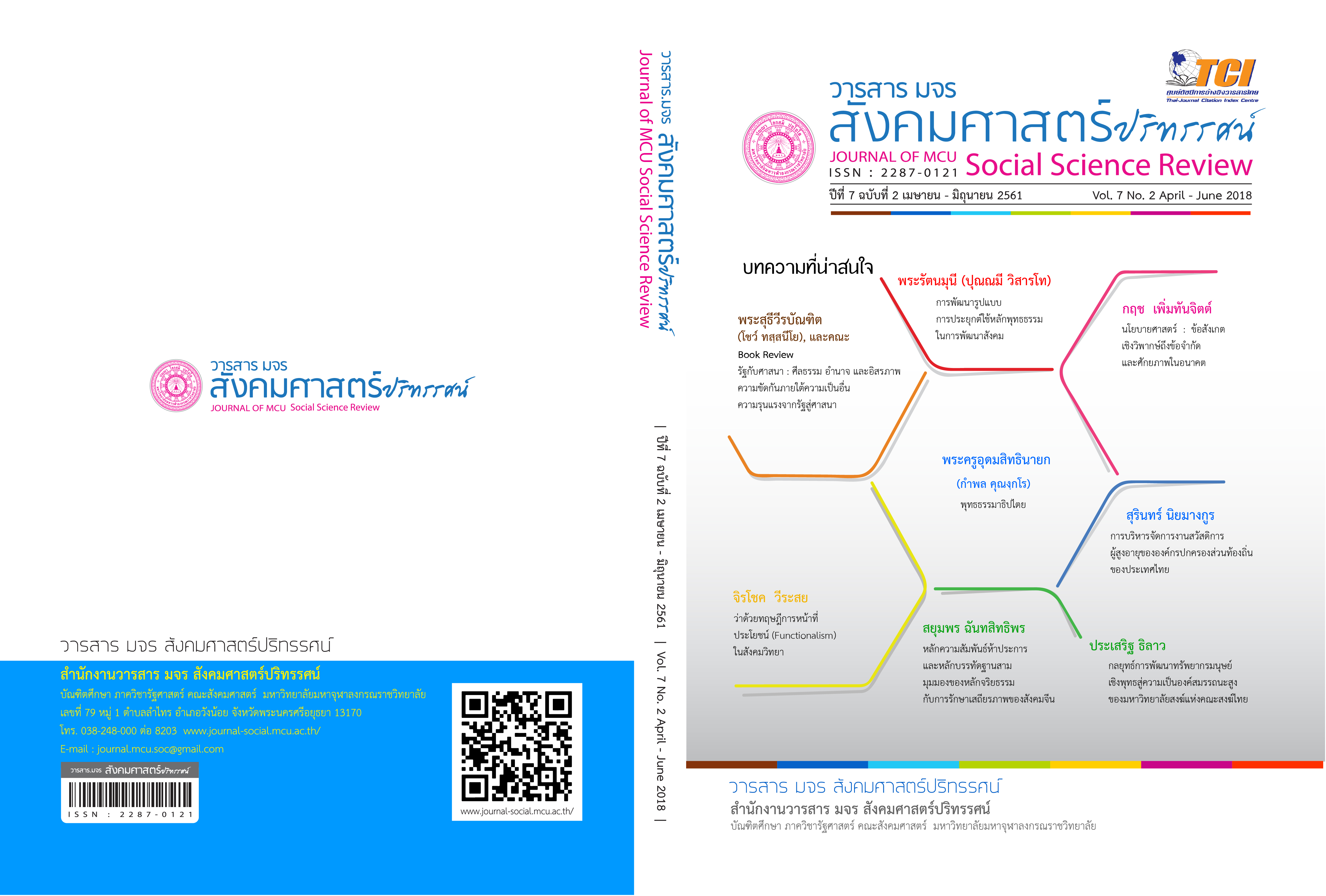รูปแบบการพัฒนาภาวะผู้นาการเปลี่ยนแปลงตามแนวพุทธ ของผู้บริหารสถานศึกษา สังกัดสานักงานเขตพื้นที่การศึกษามัธยมศึกษา
Suphaphorn Phrommna
คำสำคัญ:
การพัฒนา, ภาวะผู้นา, สานักงานเขตพื้นที่การศึกษามัธยมศึกษาบทคัดย่อ
บทความนี้มีวัตถุประสงค์ เพื่อศึกษาสภาพปัจจุบันการบริหารของผู้บริหารสถานศึกษาสังกัดสานักงานเขตพื้นที่การศึกษามัธยมศึกษา เพื่อพัฒนารูปแบบการพัฒนาภาวะผู้นาการเปลี่ยนแปลงตามแนวพุทธของผู้บริหารสถานศึกษา สังกัดสานักงานเขตพื้นที่การศึกษามัธยมศึกษา และเพื่อตรวจสอบการพัฒนารูปแบบการพัฒนาภาวะผู้นาการเปลี่ยนแปลงตามแนวพุทธของผู้บริหารสถานศึกษา สังกัดสานักงานเขตพื้นที่การศึกษามัธยมศึกษา โดยใช้ระเบียบวิธีวิจัยแบบผสมผสานวิธี (Mixed Methods Research) คือ การวิจัยคุณภาพ (Qualitative Research) ได้แก่ 1) การสัมภาษณ์ผู้ทรงคุณวุฒิจานวน 5 คน และการสนทนากลุ่ม (Focus Group Discussion) โดยผู้ทรงคุณวุฒิจานวน 10 รูป/คน โดยใช้แบบการสัมภาษณ์ การวิเคราะห์ข้อมูล ใช้การวิเคราะห์เนื้อหา และการวิจัยเชิงปริมาณ (Quantitative Research) กลุ่มตัวอย่าง ได้แก่ ผู้บริหารสถานศึกษาสังกัดสานักงานเขตพื้นที่การศึกษามัธยมศึกษา จานวน 325 คน โดยใช้แบบสอบถาม การวิเคราะห์ข้อมูล ได้แก่ ค่าร้อยละความถี่ ค่าเฉลี่ยเลขคณิต และส่วนเบี่ยงเบนมาตรฐาน (S.D.) ผลการวิจัยพบว่า 1. สภาพปัจจุบันการบริหารสถานศึกษาของผู้บริหารสถานศึกษาสังกัดสานักงานเขตพื้นที่การศึกษามัธยมศึกษา พบว่า การบริหารสถานศึกษาของผู้บริหารสถานศึกษา ยังยึดติดอยู่กับรูปแบบการบริหารหรือการทางานแบบเดิม ไม่ปรับเปลี่ยนให้เข้ากับสถานการณ์การเปลี่ยนแปลงใน สังคมปัจจุบัน การขับเคลื่อนองค์กร ยังไม่ประสบผลสาเร็จเท่าที่ควรตามแนวทางการปฏิรูประบบราชการและการปฏิรูปการศึกษา การพัฒนาสถานศึกษายังไม่ตอบสนองความต้องการของผู้เรียน ชุมชน และสังคมได้อย่างเต็มที่ และยังไม่สอดคล้องกับการเปลี่ยนแปลงทางเศรษฐกิจและสังคมในยุคปัจจุบัน การบริหารสถานศึกษาใช้หลักการบริหาร 7 หลักการ ประกอบด้วย หลักการกระจายอานาจ หลักการมีส่วนร่วม หลักการคืนอานาจการจัดการศึกษาให้ประชาชน หลักการบริหารตนเอง หลักการตรวจสอบและถ่วงดุล หลักการมีภาวะผู้นาแบบเกื้อหนุน หลักการพัฒนาทั้งระบบยังไม่ชัดเจนและไม่ครบถ้วน การบริหารสถานศึกษา ผู้บริหารสถานศึกษาใช้ภาวะผู้นาการเปลี่ยนแปลง การมีส่วนร่วม PDCA เทคโนโลยีสารสนเทศและการสื่อสารและมีการพัฒนาทรัพยากรมนุษย์ ยังไม่ต่อเนื่อง ผู้บริหารสถานศึกษา มีองค์ประกอบคุณลักษณะภาวะผู้นาที่พึงประสงค์ของผู้บริหารสถานศึกษามี 6 องค์ประกอบได้แก่ ด้านบุคลิกภาพ ด้านความรับผิดชอบ ด้านสมรรถวิสัยในการทางาน ด้านวุฒิภาวะทางอารมณ์ ด้านมนุษยสัมพันธ์ และด้านการมีวิสัยทัศน์ แต่ในทางปฏิบัติมีความไม่สอดคล้องกัน 2. รูปแบบการพัฒนาภาวะผู้นาการเปลี่ยนแปลงตามแนวพุทธของผู้บริหารสถานศึกษา สังกัดสานักงานเขตพื้นที่การศึกษามัธยมศึกษา ประกอบด้วย 4 ส่วน คือ ส่วนที่ 1 ส่วนนาของการพัฒนารูปแบบการพัฒนาภาวะผู้นาการเปลี่ยนแปลง ประกอบด้วย 1) หลักการพัฒนาภาวะผู้นาการเปลี่ยนแปลง 2) วัตถุประสงค์ของการพัฒนาภาวะผู้นาการเปลี่ยนแปลง 3) บริบทของสถานศึกษา ส่วนที่ 2 ตัวแบบของกระบวนการพัฒนาภาวะผู้นาการเปลี่ยนแปลง ประกอบด้วย 1) องค์ประกอบของภาวะผู้นาการเปลี่ยนแปลง 2) คุณลักษณะของภาวะผู้นาการเปลี่ยนแปลง 3) ขั้นตอนการพัฒนาภาวะผู้นาการเปลี่ยนแปลง 4) หลักธรรมสาหรับการพัฒนาภาวะผู้นาการเปลี่ยนแปลง คือ หลักสัปปุริสธรรม 7 ส่วนที่ 3 การนารูปแบบไปใช้ มีองค์ประกอบย่อย ได้แก่ 1) การเตรียมการดาเนินงาน 2) การดาเนินงาน 3) การประเมินผลการดาเนินงาน และส่วนที่ 4 เงื่อนไขความสาเร็จของการนารูปแบบไปใช้ ประกอบด้วย 1) การบริหารแบบมีส่วนร่วม 2) การพัฒนาคุณลักษณะภาวะผู้นาการเปลี่ยนแปลงของผู้บริหารอย่างต่อเนื่อง 3) การนิเทศ กากับติดตามอย่างต่อเนื่อง 4) การสร้างความร่วมมือและเครือข่ายการพัฒนา 3. การตรวจสอบการพัฒนารูปแบบการพัฒนาภาวะผู้นาการเปลี่ยนแปลงตามแนวพุทธของผู้บริหารสถานศึกษา สังกัดสานักงานเขตพื้นที่การศึกษามัธยมศึกษา พบว่า ด้านความเป็นประโยชน์ มีค่าเฉลี่ยมากที่สุด รองลงมาคือ ความเหมาะสม ด้านความถูกต้อง และความเป็นไปได้ ตามลาดับ
ดาวน์โหลด
เผยแพร่แล้ว
รูปแบบการอ้างอิง
ฉบับ
ประเภทบทความ
สัญญาอนุญาต
ลิขสิทธิ์ (c) 2018 วารสาร มจร สังคมศาสตร์ปริทรรศน์

อนุญาตภายใต้เงื่อนไข Creative Commons Attribution-NonCommercial-NoDerivatives 4.0 International License.
เพื่อให้เป็นไปตามกฎหมายลิขสิทธิ์ ผู้นิพนธ์ทุกท่านต้องลงลายมือชื่อในแบบฟอร์มใบมอบลิขสิทธิ์บทความให้แก่วารสารฯ พร้อมกับบทความต้นฉบับที่ได้แก้ไขครั้งสุดท้าย นอกจากนี้ ผู้นิพนธ์ทุกท่านต้องยืนยันว่าบทความต้นฉบับที่ส่งมาตีพิมพ์นั้น ได้ส่งมาตีพิมพ์เฉพาะในวารสาร มจร สังคมศาสตร์ปริทรรศน์ เพียงแห่งเดียวเท่านั้น หากมีการใช้ภาพหรือตารางหรือเนื้อหาอื่นๆ ของผู้นิพนธ์อื่นที่ปรากฏในสิ่งตีพิมพ์อื่นมาแล้ว ผู้นิพนธ์ต้องขออนุญาตเจ้าของลิขสิทธิ์ก่อน พร้อมทั้งแสดงหนังสือที่ได้รับการยินยอมต่อบรรณาธิการ ก่อนที่บทความจะได้รับการตีพิมพ์ หากไม่เป็นไปตามข้อกำหนดเบื้องต้น ทางวารสารจะถอดบทความของท่านออกโดยไม่มีข้อยกเว้นใดๆ ทั้งสิ้น





